ACT Science Practice Test 54
Bộ sưu tập: Tuyển Tập Bộ Đề Thi Đại Học Hoa Kỳ (ACT) - Có Đáp Án Chi Tiết
Số câu hỏi: 10 câuSố mã đề: 1 đềThời gian: 1 giờ
217,654 lượt xem 16,738 lượt làm bài
Bạn chưa làm đề thi này!
PASSAGE I
A pluvial lake is an ancient lake with high water levels, generally associated with times of high precipitation. Lake Bonneville was a prehistoric pluvial lake that covered much of North America's Great Basin region during the last ice age (see Figure 1). Most of the territory it covered was in present-day Utah, though parts of the lake extended into present-day Idaho and Nevada. Formed about 32,000 years ago, it existed until about 16,800 years ago, when most of the contents of the lake were released through the Red Rock Pass in Idaho.
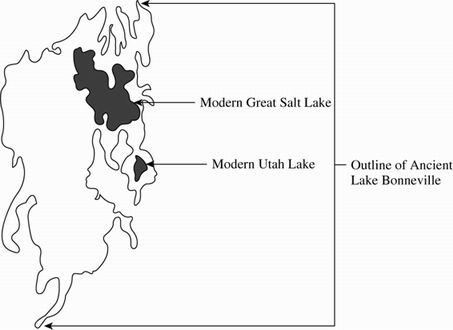
Figure 1
At more than 1,000 feet (305 m) deep and more than 19,691 square miles (50,999.5 km2) in area, Lake Bonneville was nearly as large as Lake Michigan and significantly deeper. Over time, increasing temperatures in North America caused the lake to begin drying up, leaving Great Salt Lake, Utah Lake, Sevier Lake, Rush Lake, and Little Salt Lake as remnants. While each of these lakes is considered a freshwater lake, the salinity levels are higher than normal. Figure 2 shows a cross-section of part of Utah Lake and its sediment and bedrock, with measurements taken at the cities of Genola and Provo and two test sites in between.
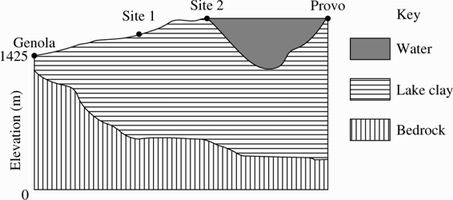
Figure 2
According to Figure 2, the lake clay deposit is thinnest at which of the following locations?
Genola
Test Site 1
Test Site 2
Provo
According to the passage, Lake Bonneville existed in its entirety for approximately how many years?
32,000
16,800
15,200
Cannot be determined from the given information
According to Figure 2, as the thickness of the lake clay increases from Genola to Site 2, the thickness of the bedrock beneath it:
increases overall.
remains the same.
first increases and then decreases.
decreases overall.
According to Figure 2, which of the following graphs best represents the elevations, in meters above sea level, of the top of the lake clay layer at Test Sites 1 and 2?
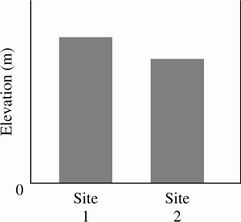
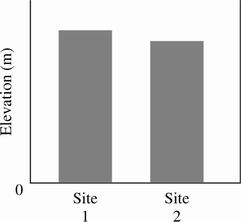
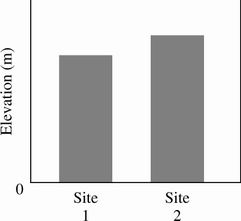
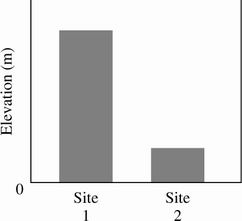
Great Salt Lake is fed mainly by 3 tributary rivers that deposit large amounts of minerals into its waters. The lake is salty because it has no outflow for water other than evaporation, which is predominately mineralfree. If local temperatures were to decrease significantly, while freshwater rain were to increase significantly, what would be the likely resulting change in the salinity of Great Salt Lake?
Salinity would decrease.
Salinity would increase.
Salinity would remain the same.
Salinity cannot be predicted.
PASSAGE II
The order Lepidoptera includes butterflies and moths. Table 1 is a key for identifying some Lepidoptera in North America.
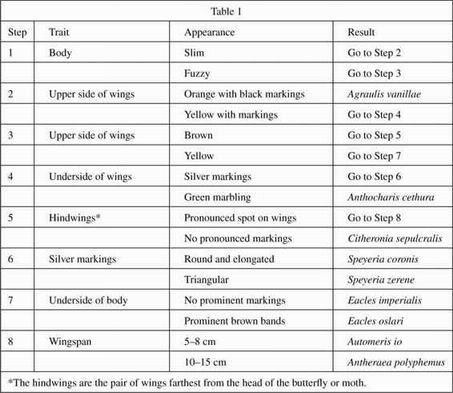
Table 2 describes 4 Lepidoptera that were seen in North America.
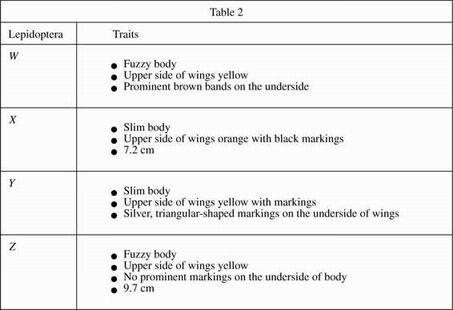
Table 1 is used to identify animals that belong to which of the following groups?
Birds
Reptiles
Insects
Mammals
Based on the information provided, the Lepidoptera listed in Table 1 that is most closely related to Agraulis vanillae most likely has which of the following characteristics?
Fuzzy body.
Wings with orange and black markings.
Hindwings with pronounced spots.
Green marbling on underside of wings.
Based on Table 1, which of the following traits of Lepidoptera Y indicates that it is NOT a Speyeria coronis?
Slim body.
Yellow upper side of wings, with markings.
Triangular, silver markings on the underside of wings.
Round, elongated silver markings on the underside of wings.
The results from Table 1 for Lepidoptera W and Lepidoptera Z first diverge at which of the following steps?
Step 1.
Step 3.
Step 7.
Step 8.
According to Table 1, Automeris io and Antheraea polyphemus both have which of the following traits?
Pronounced spot on hindwings.
Round markings on the underside of body.
A wingspan of 5-8 cm.
Slim bodies.
1 mã đề 12 câu hỏi
1 mã đề 24 câu hỏi
1 mã đề 26 câu hỏi
1 mã đề 12 câu hỏi
1 mã đề 24 câu hỏi
